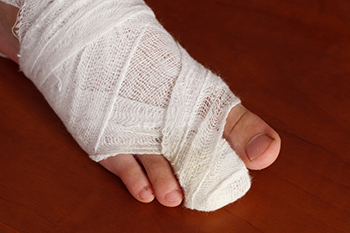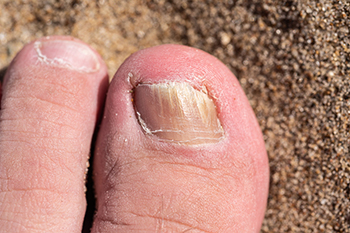
Toe fractures usually result from direct trauma, such as stubbing the toe or dropping something on the foot. The most frequently affected areas are the lesser toes, especially the part of the toe closest to the rest of the foot. Types of toe fractures include simple fractures, where the bone remains intact under the skin, and compound fractures, where the bone breaks through the skin and may lead to infection. Avulsion fractures occur when a tendon or ligament pulls a piece of bone away, while comminuted fractures involve the bone shattering into multiple fragments. Intra-articular fractures extend into the joint and may affect long-term toe mobility, and dislocation fractures combine a bone break with joint misalignment. A podiatrist can assess the injury using imaging such as X-rays to determine the type of fracture and the degree of bone displacement. Treatment may involve immobilization with a cast or walking boot, or in more severe cases, surgery to realign and secure the bones. If you have broken or severely bruised your toe, it is suggested that you schedule an appointment with a podiatrist for appropriate treatment.
Broken toes may cause a lot of pain and should be treated as soon as possible. If you have any concerns about your feet, contact Elliot T. Udell, DPM from New York. Our doctor will treat your foot and ankle needs.
What Is a Broken Toe?
A broken toe occurs when one or more of the toe bones of the foot are broken after an injury. Injuries such as stubbing your toe or dropping a heavy object on it may cause a toe fracture.
Symptoms of a Broken Toe
- Swelling
- Pain (with/without wearing shoes)
- Stiffness
- Nail Injury
Although the injured toe should be monitored daily, it is especially important to have a podiatrist look at your toe if you have severe symptoms. Some of these symptoms include worsening or new pain that is not relieved with medication, sores, redness, or open wounds near the toe.
If you have any questions, please feel free to contact our office located in Hicksville, NY . We offer the newest diagnostic and treatment technologies for all your foot care needs.

Intoeing and out-toeing are common walking patterns seen in children, where the feet point inward or outward instead of straight ahead. These patterns are usually part of normal development and often improve with time. In-toeing may result from femoral anteversion, a condition where the thigh bone has increased inward rotation. It can also be caused by internal tibial torsion, where the shin bone twists inward, or by a curved foot known as metatarsus adductus. Out-toeing occurs when the feet angle away from the body and may be linked to external rotation of the hips or legs. In most cases, these conditions do not cause pain and do not interfere with normal activity. If your child has symptoms of either ailment, it is suggested that you visit a podiatrist who can monitor these conditions.
The health of a child’s feet is vital to their overall well-being. If you have any questions regarding foot health, contact Elliot T. Udell, DPM of New York. Our doctor can provide the care you need to keep you pain-free and on your feet.
Tips for Keeping Children's Feet Healthy
- Make sure their shoes fit properly
- Look for any signs of in-toeing or out-toeing
- Check to see if they have Clubfoot (condition that affects your child’s foot and ankle, twisting the heel and toes inward) which is one of the most common nonmajor birth defects.
- Lightly cover your baby’s feet (Tight covers may keep your baby from moving their feet freely, and could prevent normal development)
- Allow your toddler to go shoeless (Shoes can be restricting for a young child’s foot)
- Cut toenails straight across to avoid ingrown toenails
- Keep your child’s foot clean and dry
- Cover cuts and scrapes. Wash any scratches with soap and water and cover them with a bandage until they’ve healed.
If you have any questions, please feel free to contact our office located in Hicksville, NY . We offer the newest diagnostic and treatment technologies for all your foot care needs.

Fungal toenail infections usually begin at the tip or sides of the toenail and may cause discoloration, thickening, and crumbling of the nail surface. In some cases, the nail may lift from the nail bed or become painful if the surrounding skin becomes inflamed. While fungal toenail infections are common, they can be difficult to clear without medical treatment. A podiatrist can examine the toenail and confirm the infection through a laboratory test. Based on the findings, oral antifungal medication may be prescribed, often requiring several months of consistent use. These medications target the infection from within and support the regrowth of healthy nail tissue. Because oral antifungals can affect liver function, a podiatrist may request blood tests before and during treatment. If the infection is severe and the nail is extensively damaged, surgery to remove part or all of the nail might be recommended. This can help eliminate the infection and allow a clear nail to grow back. If you believe you have a toenail infection, it is suggested that you schedule an appointment with a podiatrist for an exam, diagnosis, and treatment.
If left untreated, toenail fungus may spread to other toenails, skin, or even fingernails. If you suspect you have toenail fungus it is important to seek treatment right away. For more information about treatment, contact Elliot T. Udell, DPM of New York. Our doctor can provide the care you need to keep you pain-free and on your feet.
Symptoms
- Warped or oddly shaped nails
- Yellowish nails
- Loose/separated nail
- Buildup of bits and pieces of nail fragments under the nail
- Brittle, broken, thickened nail
Treatment
If self-care strategies and over-the-counter medications does not help your fungus, your podiatrist may give you a prescription drug instead. Even if you find relief from your toenail fungus symptoms, you may experience a repeat infection in the future.
Prevention
In order to prevent getting toenail fungus in the future, you should always make sure to wash your feet with soap and water. After washing, it is important to dry your feet thoroughly especially in between the toes. When trimming your toenails, be sure to trim straight across instead of in a rounded shape. It is crucial not to cover up discolored nails with nail polish because that will prevent your nail from being able to “breathe”.
In some cases, surgical procedure may be needed to remove the toenail fungus. Consult with your podiatrist about the best treatment options for your case of toenail fungus.
If you have any questions, please feel free to contact our office located in Hicksville, NY . We offer the newest diagnostic and treatment technologies for all your foot care needs.

Foot arthritis can cause pain, stiffness, and reduced mobility, making daily activities more challenging. It often develops from wear and tear on the joints, inflammation, or conditions such as rheumatoid arthritis. Regular foot exercises can help improve flexibility, reduce discomfort, and strengthen the surrounding muscles. The plantar fascia stretch involves gently pulling the toes back to stretch the bottom of the foot, easing tension and improving movement. A calf stretch helps loosen the Achilles tendon and reduce strain on the heel. Rolling a golf ball under the foot massages the plantar fascia, promoting circulation and relieving tightness. Additionally, marble pick-ups strengthen the toes by encouraging small movements that improve coordination and flexibility. If you have arthritis that is affecting your feet, it is suggested that you consult a podiatrist who can help you find relief, and also recommend additional foot stretches.
Arthritis can be a difficult condition to live with. If you are seeking treatment, contact Elliot T. Udell, DPM from New York. Our doctor can provide the care you need to keep you pain-free and on your feet.
Arthritic Foot Care
Arthritis is a joint disorder that involves the inflammation of different joints in your body, such as those in your feet. Arthritis is often caused by a degenerative joint disease and causes mild to severe pain in all affected areas. In addition to this, swelling and stiffness in the affected joints can also be a common symptom of arthritis.
In many cases, wearing ill-fitting shoes can worsen the effects and pain of arthritis. Wearing shoes that have a lower heel and extra room can help your feet feel more comfortable. In cases of rheumatoid arthritis, the arch in your foot may become problematic. Buying shoes with proper arch support that contour to your feet can help immensely.
Alleviating Arthritic Pain
- Exercises that stretch the foot can prevent further pain and injury and increase mobility
- Most of the pain can be alleviated with anti-inflammatory drugs, heat, and topical medications
- Massages can help temporarily alleviate pain.
It is best to see your doctor for the treatment that is right for your needs and symptoms. Conditions vary, and a podiatrist can help you determine the right method of care for your feet.
If you have any questions, please feel free to contact our office located in Hicksville, NY . We offer the newest diagnostic tools and technology to treat your foot and ankle needs.
